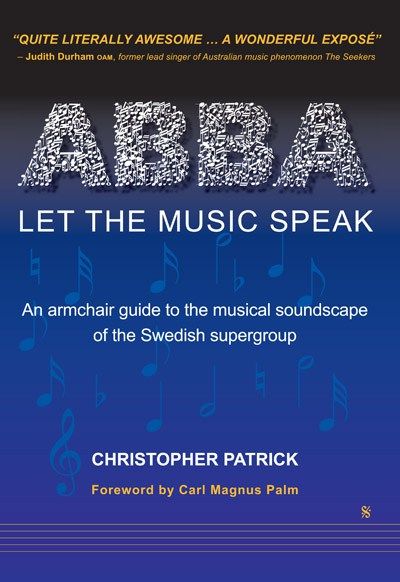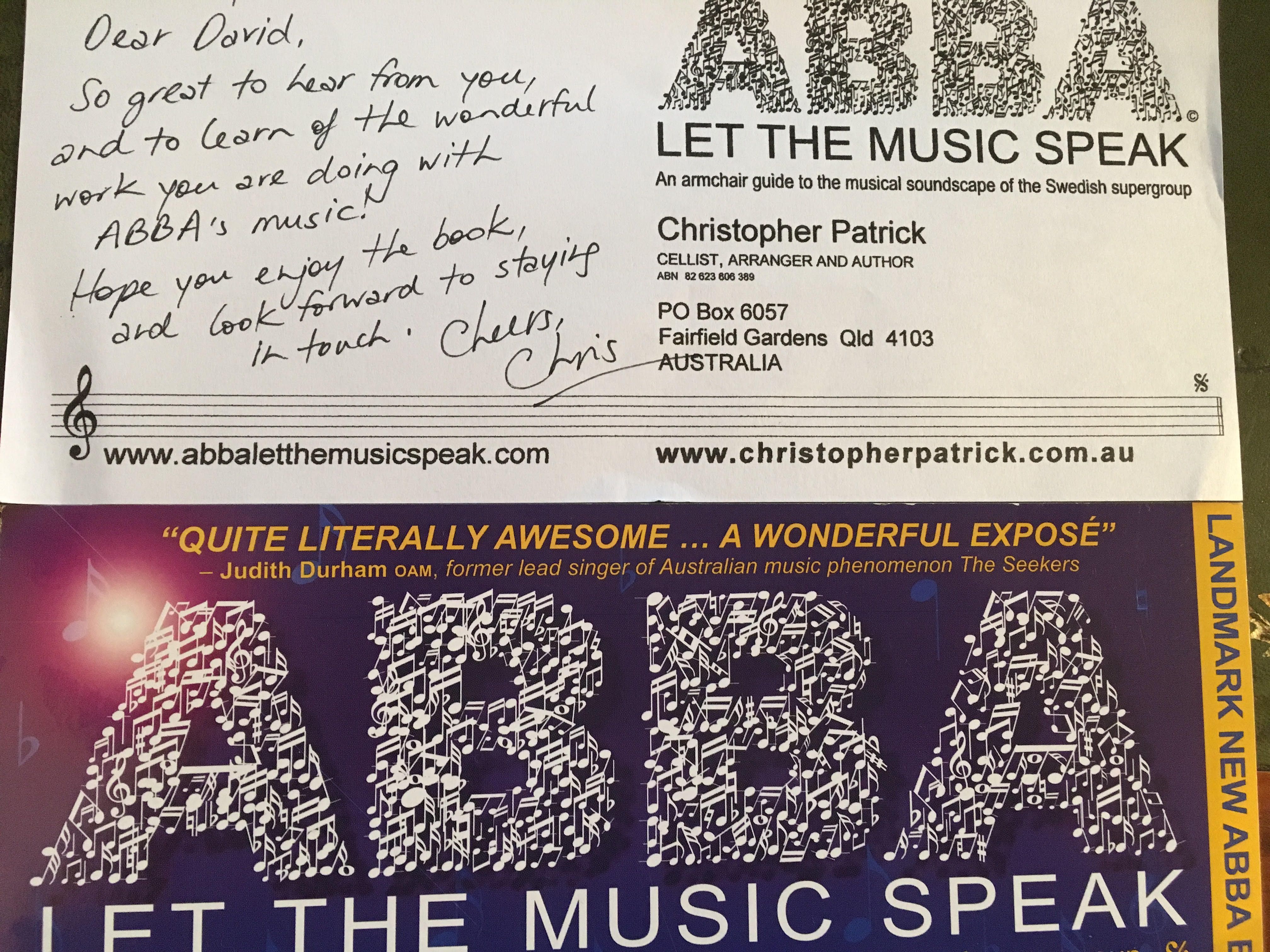ABBA - Let The Music Speak - Exclusive Interview with book author Christopher Patrick

The Swedish supergroup ABBA impacted the world of popular music in the 70's as 'The Beatles' did in the 60's. Their success and legacy continues to this day through the movie and musical 'Mamma Mia' and 'Chess'. Having completed a Masters degree in Music, with a strong focus on songwriting, I have always been intrigued by their special sauce

‘ABBA – Let The Music Speak' by Christopher Patrick is without a doubt the ultimate guide to the musical soundscape of Abba’s enduring music. It was my great privilege recently to chat with the book’s author, Christopher Patrick, who very generously gave of his time to answer my questions. If you are an ABBA fan and haven’t read this book yet, please do yourself a huge favor and order a copy directly from Chris’s website. (Details below)
Before we get down to Chris’s actual interview, let’s hear what ABBA’s Anni-Frid “Frida” Lyngstad herself has to say about ‘ABBA – Let The Music Speak‘, :-
“I am so happy to at last read a book that concentrates on our music and not on gossip about the band members. You have written a literally wonderful exposé, and should be very proud of your work. Thank you so much for letting me have a copy. I will always cherish it. Warm wishes, Frida x”
Without further ado, let’s hear what Christopher has to say!
Why did you write this book? What inspired you to create it and how did you get started?
Christopher: There are biographies, picture books, kiss-and-tell books … but nothing specifically about the music – the actual melodies themselves. Bjorn once said, “We write songs that we would like to hear,” so I decided to write a book I would like to read. My book is for those who know what they like, and want to know more about why they like it.
What do you feel makes this book special? What sets it apart from other available literature about ABBA?
Christopher: I wanted to redefine the public perception of ABBA. When Björn said, “Why us? Why me?” for the umpteenth time on that 2001 BBC TV documentary series Walk On By – The Story Of Popular Song, I set out to give the oldest member of ABBA some answers. I’ve examined, in a relaxed yet forensic way, what ABBA did to create music that continues to endear.
I wanted all my fellow fans (and also any detractors!) to be intrigued by such things as:
• “The Winner Takes It All” and “Super Trouper” have a refrain chord sequence in common.
• Frida could sing as high as Agnetha in falsetto register and did so with style – as upper harmony vocalist – on several ABBA songs.
• Benny and Bjorn re-used good melodic hooks during the ABBA years (as a teaser, hum the opening verse bars of “Dum Dum Diddle” and “The Way Old Friends Do”).
• Identical melodic verse phrases reappear in the choruses of some songs.
• The importance of what I call “the power of three” (do-re-mi) – a pivotal force in the construction of ABBA’s melodies.
• Why some songs fell a little short of the ABBA blueprint for success; B-sides and cast-asides like “Crazy World”, “Put On Your White Sombrero” and “Just Like That” nevertheless deserve their moments in the sun, musical excerpts from each appearing in print for the very first time!
Wow! If you could ask the group members of ABBA one thing, and get an answer from all of them, what would it be, and why?
Christopher: The album that was their most artistically fulfilling recording experience … fans can usually name a favourite, but I’m intrigued by the fact that the individual ABBA members’ choices may be as surprising as they are varied.
For any readers new to ABBA, how would they get the most out of your book?
Christopher: By reading it from cover to cover! Seriously though, I’ve divided the book into four parts: The Albums, The Sound and The Melodies comprise the main narrative, with a fourth section featuring a glossary of musical terms, The World Of ABBA (a timeline of the group’s history in the context of musical trends and world events surrounding them), a discography, and a comprehensive index and list of musical figures that appear throughout the book.
For songwriters, the ‘nuts and bolts’ construction of The Melodies may be the first port of call, while others may prefer the organic overview of The Albums to lay the groundwork. Some even start with The World Of ABBA and work backwards … it’s totally up to the individual.
During your research into ABBA’s music, was there anything you uncovered that genuinely surprised you?
Christopher: As a music student and later as a music professional, I’d spent thirty-odd years aurally processing ABBA songs prior to writing “ABBA – Let The Music Speak”, so my appreciation of Benny and Björn’s compositional craft and the girls’ harmonic compatibility was constantly evolving in tandem with the songs themselves. My ears stored many things over many years, and my joy of discovery is now permanently documented for others to read.
In terms of their musical identity, I have always been struck by ABBA’s ability to share intensely personal and honest introspective lyrics. What elements would you say helped create their unique sound?
Christopher: The thing I appreciated about ABBA was their easygoing, down-to-earth approach to life and love. Lyrics always came after the music, which surprises many.
For Björn, the style of music would suggest a certain kind of lyric, and his lyrics would reflect his emotional response to that music. In terms of their sound, the ‘vari-speed’ recording technique introduced on the song “Ring Ring” by engineer Michael B. Tretow ensured ABBA’s production standards were always a cut above the rest.
The ABBA sound is quite international – a synthesis of styles, firmly rooted in the European tradition of strong melodies, yet with a hint of rock, Swedish folk and American pop thrown in as well.
Do you have any enduring personal favourite ABBA tracks? Could you share the reasons why with us?
Christopher: Pinpointing favourites is always difficult, but I’d say:
- ‘The Winner Takes It All’* for its soul-laid-bare emotional rollercoaster ride;
“The Name Of The Game” for its funky refrain, two contrasting lead vocal bridge passages and killer chorus hook; - “Super Trouper”* for the harmonic massage of Frida’s milk-and-honey lead vocal and Agnetha’s equally captivating backing vocals (a showcase example of ABBA’s ability to paint over an inherently melancholy melody with vibrant colours);
“One Of Us” for bass player Rutger Gunnarsson’s quirky and eminently conversational bass line (check out the number of bass players playing along to the track on YouTube). Just to name four …
Can, or did, you identify any particular ‘Aha’ or ‘Eureka’ moment or strategy that helped catapult Benny and Bjorn as songwriters from ‘very good’ to ‘legendary’ status?
Christopher: The key word here is organic … it’s the way the four members came together as a group, and reflects Benny and Björn’s evolution as song writers. Strategy-wise, the decisions to record exclusively in English and their recognition of the girls’ unique ‘one-voice’ chemistry were masterstrokes.
1975’s “SOS” would be my ‘Aha’ moment – the prolific use of the minor key lifted the wall-of-sound ABBA production template to an exhilarating new level. The follow-up (and aptly titled) “Arrival” LP said it all … spectacularly shedding the influential shackles that had pervaded up to that time.
What are your future plans? Have you any further book projects in the pipeline?
Christopher: I love writing about music. Having an emotional connection to the subject matter is always beneficial to the creative process. I’m currently co-authoring a world’s-first book on the 1960s Australian pop-folk super group, The Seekers.
They achieved for Australia what ABBA did for their native Sweden: become the first popular singing group to reach an international audience, and the first Australian group to achieve million-selling status in the UK and the US respectively with their hit songs “I’ll Never Find Another You” and “Georgy Girl”.
The Seekers were together for five years before splitting up in 1968 at the peak of their success. They reunited to great acclaim for their 25th Anniversary in 1993, and celebrated their recent 50th Anniversary with a sellout concert tour of Australia, New Zealand and the UK.
We all wish Christopher every success with his latest book venture. You can find ‘ABBA – Let The Music Speak’ and read lots more about Chris at http://christopherpatrick.com.au/
Finally, I’d like to thank Christopher for giving so generously and graciously of his time and sharing his tremendous research into ABBA’s music with the rest of us. Thanks Chris!

I first published this exclusive interview on my website http://www.AbbaPiano.com on Nov. 12th 2014.
good information about ABBA great work @davidbrogan...
Congratulations @davidbrogan! You have received a personal award!
Click on the badge to view your own Board of Honor on SteemitBoard.
For more information about this award, click here
Congratulations @davidbrogan! You have completed some achievement on Steemit and have been rewarded with new badge(s) :
Click on any badge to view your own Board of Honor on SteemitBoard.
For more information about SteemitBoard, click here
If you no longer want to receive notifications, reply to this comment with the word
STOPDoing this as a test: @steemprice
Test didn't work! Thought posting @steemprice gave you a current valuation of Steem as a comment on your post. Oh well!